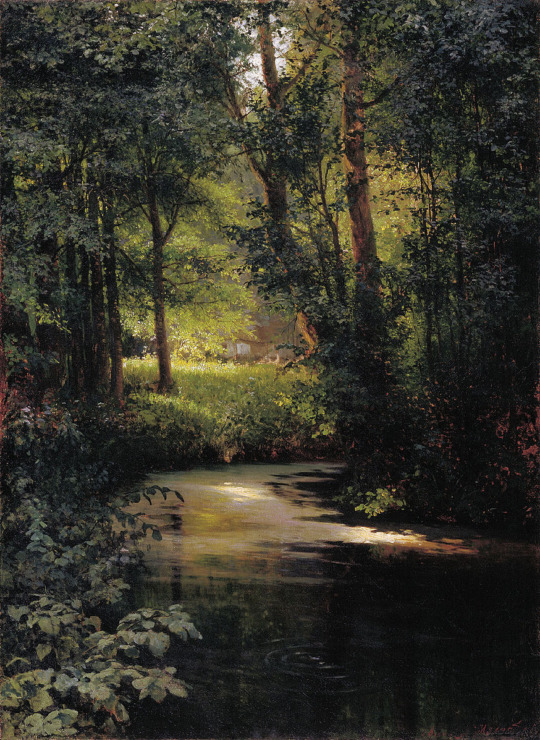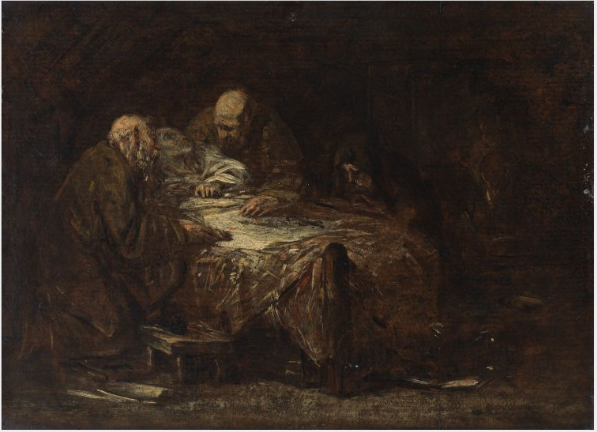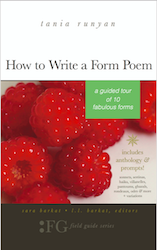< Return to Edgar Allan Poe Poems
For Annie
Thank Heaven! the crisis—
The danger is past,
And the lingering illness
Is over at last—
And the fever called “Living”
Is conquered at last.
Sadly, I know,
I am shorn of my strength,
And no muscle I move
As I lie at full length—
But no matter!—I feel
I am better at length.
And I rest so composedly,
Now in my bed,
That any beholder
Might fancy me dead—
Might start at beholding me
Thinking me dead.
The moaning and groaning,
The sighing and sobbing,
Are quieted now,
With that horrible throbbing
At heart:—ah, that horrible,
Horrible throbbing!
The sickness—the nausea—
The pitiless pain—
Have ceased, with the fever
That maddened my brain—
With the fever called “Living”
That burned in my brain.
And oh! of all tortures
That torture the worst
Has abated—the terrible
Torture of thirst,
For the naphthaline river
Of Passion accurst:—
I have drank of a water
That quenches all thirst:—
Of a water that flows,
With a lullaby sound,
From a spring but a very few
Feet under ground—
From a cavern not very far
Down under ground.
And ah! let it never
Be foolishly said
That my room it is gloomy
And narrow my bed—
For man never slept
In a different bed;
And, to sleep, you must slumber
In just such a bed.
My tantalized spirit
Here blandly reposes,
Forgetting, or never
Regretting its roses—
Its old agitations
Of myrtles and roses:
For now, while so quietly
Lying, it fancies
A holier odor
About it, of pansies—
A rosemary odor,
Commingled with pansies—
With rue and the beautiful
Puritan pansies.
And so it lies happily,
Bathing in many
A dream of the truth
And the beauty of Annie—
Drowned in a bath
Of the tresses of Annie.
She tenderly kissed me,
She fondly caressed,
And then I fell gently
To sleep on her breast—
Deeply to sleep
From the heaven of her breast.
When the light was extinguished,
She covered me warm,
And she prayed to the angels
To keep me from harm—
To the queen of the angels
To shield me from harm.
And I lie so composedly,
Now in my bed
(Knowing her love)
That you fancy me dead—
And I rest so contentedly,
Now in my bed,
(With her love at my breast)
That you fancy me dead—
That you shudder to look at me.
Thinking me dead.
But my heart it is brighter
Than all of the many
Stars in the sky,
For it sparkles with Annie—
It glows with the light
Of the love of my Annie—
With the thought of the light
Of the eyes of my Annie.
—Edgar Allan Poe
Enjoy Artistic Interpretations of “For Annie” by Edgar Allan Poe
Forest Creek by Grigoriy Myasoyedov, 1890.
A Deathbed Scene by George Bernard O’Neill, 1913
Listen to Readings of “For Annie”
Listen to Musical Interpretations of “For Annie” by Edgar Allan Poe
About Edgar Allan Poe
Edgar Allan Poe (1809-1849) published his first collection of poems, Tamarlane, and Other Poems, in 1827, when he was 18 years old. A tendency to run up debts (including for gambling) kept him in constant state of reinvention – college student, poet, short story writer, soldier/officer school, literary journal editor and critic.
The Poe who arises from Symons’ hand (his biographer in The Telltale Heart: The Life and Works of Edgar Allan Poe) is a man who first and foremost was determined to put Southern letters on the map, aiming to wrest control from the literary establishment in New York and New England (Poe aimed some rather pointed arrows at writers like Henry Wadsworth Longfellow). For his own writing, he wanted to be considered a poet. The poems were the important works; the stories were almost after-thoughts, almost dashed off primarily to raise funds. And he always needed money.
His personal life seemed to have stayed a general mess, but he had an enormous impact on both American and world literature. Consider the stories and poems that have been filmed, published, re-published, anthologized, celebrated and widely admired for more than 150 years: “Murders in the Rue Morgue,” “Fall of the House of Usher,” The Raven, “The Tell-Tale Heart,” Annabel Lee, “The Bells,” “Ulalame,” “To Helen.”
We associate Edgar Allan Poe with 19th century gothic. His stories are full of mystery, passion, horror, violence, death, and the supernatural. And yet his poems, especially “The Raven” and “Annabel Lee,” made him famous in pre-Civil War America and established his literary reputation.
Questions and mystery surrounded Poe’s own life and death, and continue even today – we may never know who left three roses and a bottle of cognac on his grave in Baltimore for decades until 2011 (alas, the “Poe Toaster” disappeared or died, to be seen nevermore).
You can read more about Poe’s biography in the articles Poets and Poems: Meeting Edgar Allan Poe and Forgotten Classics, The Telltale Heart by Julian Symons by Glynn Young, from which this biography was compiled.
I hope you enjoyed For Annie by Edgar Allan Poe!
BUY ‘HOW TO WRITE A FORM POEM’ NOW!


